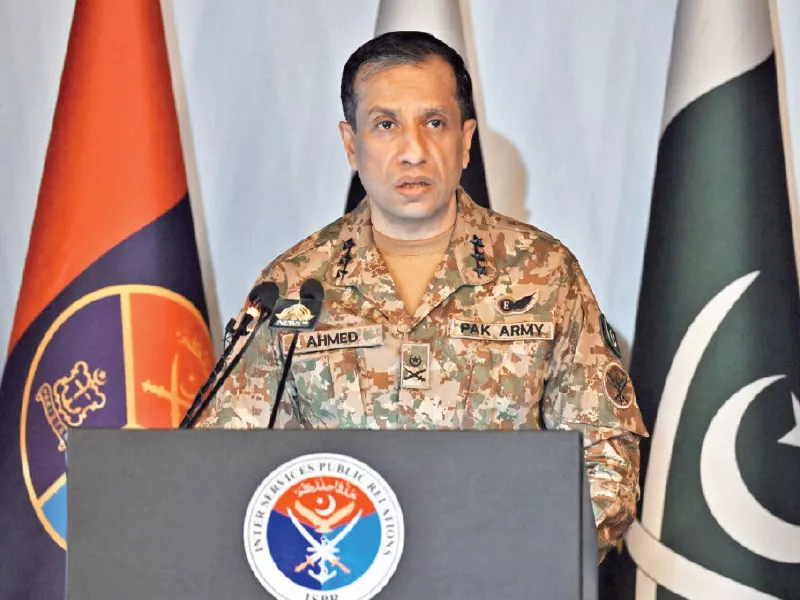Inter-Services Public Relations (ISPR) Director General Lt Gen Ahmed Sharif Chaudhry has emphasized that Pakistan is a nation that cherishes peace, but any act of aggression from India will be met with a quick and strong response.
In an interview with Anadolu Agency, the military spokesperson stated that Pakistan will not tolerate any attempts at regional dominance. “Pakistan will never submit to Indian hegemony,” he asserted, adding that “the sooner they [India] come to this realization, the better it will be for both regional stability and global peace.”
“India is not the US, and Pakistan is not Afghanistan. India is not Israel, and Pakistan is not Palestine. Pakistan will stand firm,” DG ISPR remarked, reinforcing Islamabad’s commitment to its sovereignty and the stability of the region.
Lt Gen Chaudhry also pointed to the rise of extremism and terrorism in India as a consequence of its internal policies, particularly the crackdowns on religious minorities like Muslims and Sikhs. “These actions are fueling greater internal unrest,” he noted.
These strong statements come in response to India’s recent unilateral suspension of the long-standing Indus Waters Treaty last month, which followed a tragic attack on tourists in Indian Illegally Occupied Jammu and Kashmir (IIOJK) that New Delhi blamed on Pakistan—a claim that Islamabad has firmly rejected.
Since then, tensions in the region have escalated once again. In early May, India conducted a series of cross-border strikes, not only along the Line of Control (LoC) but also into the heart of Pakistan, claiming it was targeting militant hideouts.
Pakistan has responded by targeting 26 Indian military sites, but a US-brokered ceasefire put a stop to the operations on May 10.
Still, the peace remains quite delicate. This week, Indian Prime Minister Narendra Modi’s announcement about cutting off the Indus waters flowing into Pakistan has sparked fresh concerns about potential escalation. For Islamabad, this kind of action feels like a declaration of war.
Just a day ago, in an interview with Arab News, the Director General of the Inter-Services Public Relations (DG ISPR) warned that if India were to block Pakistan’s water supply, it would cross a significant line.
“It takes a madman to think he can stop the water for over 240 million people in this country,” he stated.
“I hope we never reach that point, but if such actions occur, the world will witness the consequences, and we will be fighting those battles for years, even decades. No one should dare to stop Pakistan’s water.”
On a separate note, the DG ISPR emphasized on Monday that Pakistan is not an aggressive nation but one that prioritizes peace above all else.
“We are not a violent nation; we are a serious nation. Our top priority is peace,” Lt Gen Chaudhry shared in an interview with RT Arabic, as reported by PTV News.
“Wise and powerful nations like the United States understand the true spirit of the Pakistani people,” he added.
For the latest updates and insights on new developments, visit the NEWSON
Q1: What sparked the current escalation between the two countries?
The latest tensions followed India’s unilateral suspension of the Indus Waters Treaty last month, which came after a terrorist attack on tourists in Indian Illegally Occupied Jammu and Kashmir (IIOJK). India blamed Pakistan for the attack—a claim Pakistan has rejected.
Q2: Have there been military confrontations recently?
Yes. In early May, India launched cross-border strikes, including deep strikes into Pakistani territory, claiming to target militant hideouts. Pakistan responded by striking 26 Indian military sites. A US-brokered ceasefire brought a halt to hostilities on May 10.
Q3: What message did DG ISPR send to Indian leadership?
Lt Gen Chaudhry urged Indian policymakers to reconsider their aggressive path, stating that peace and coexistence are still possible, but only if India abandons its hegemonic ambitions. “The sooner they realize this, the better it will be for regional stability and global peace,” he stated.
Q4: How has the media covered these developments?
Multiple international outlets, including Anadolu Agency, Arab News, RT Arabic, and PTV News, have interviewed DG ISPR and reported on Pakistan’s official position. These interviews reflect Pakistan’s effort to communicate its stance clearly to both domestic and international audiences.
Q5: What is the current situation along the Line of Control (LoC)?
While a temporary ceasefire is in place, the situation remains tense and fragile. Both sides have troops on high alert, and any misstep or provocation could easily reignite cross-border hostilities.
Q6: What should the world expect moving forward?
DG ISPR cautioned that if India continues down its current path—especially with actions like suspending the Indus Waters Treaty—the region could face long-term instability. Pakistan has warned that any escalation will not end quickly, and the global community must act now to prevent a full-scale conflict.


